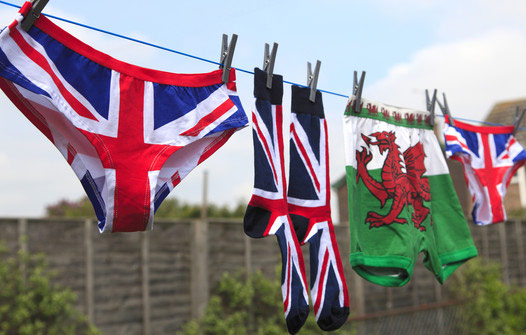
|
AFTER months in which it looked all but certain that Scotland would vote “No” to independence, there is now real concern in London at the possibility of Scotland opting for a divorce this Thursday. Polls suggest a closer race than many had predicted, with the “Yes” campaign for Scottish independence even nudging ahead of the lacklustre “No” campaign in some surveys over the past two weeks. But if Scotland does leave the United Kingdom, what of Wales? Would a Scottish “Yes” vote prompt calls from the Welsh to hold their own referendum on independence, precipitating the exit of Wales from the Union too? In fact, although Wales is in a similar position to Scotland, both in terms of history and its present constitutional arrangements, if the polls are to be believed there is almost no appetite for independence in Wales. A YouGov poll in April asked Welsh voters: “Should Wales be an independent country?”, and the answer was a resounding No. Only 12% answered positively, with 74% against (and 13% don’t knows). Curiously, the same poll showed that more Welsh supported independence for Scotland than for their own country. Furthermore, that 12% figure is probably on the high side, as several other surveys have shown support for Welsh independence at more like 5%. Not even all supporters of Plaid Cymru, the Welsh nationalist party, are in favour of independence. If Scotland votes "No" on September 18th it will certainly get more powers devolved from Westminster to Edinburgh anyway, and the same is bound to happen to Wales. But that is not expected to shift the basic Welsh objection to independence much. There are several reasons for this lack of enthusiasm. Some worry about Wales's viability as an independent nation. Wales is smaller, with a population of just over 3m, compared with Scotland’s 5.3m, and nor does it have such an obvious source of income (and power) as Scotland does with its North Sea oil. The amount of oil and gas left in the North Sea for an independent Scotland to exploit is hotly disputed, but it nonetheless adds weight to the argument of the “Yes” campaign that Scotland can go it alone financially. Wales used to be a great coal-producing country, but most of that industry is long gone. These might be termed negative reasons to stay in the Union, born of a well-founded fear of how Wales might do on its own. But the Welsh also have more positive reasons to stay in the Union than do the Scots, principally because they seem to be more comfortable with their dual identity as Welsh and British. The Welsh enjoy a high degree of devolved government and combine this with a strong sense of cultural autonomy. Thus Wales is officially a bilingual country (all the road signs, for instance, are in Welsh and English), and it is estimated that about 20% of the population speak Welsh. Wales has distinct cultural and sporting festivals, and a distinct national sport—rugby football. Yet despite this firm Welsh identity, Wales is closely linked to England both economically and politically—more so than Scotland. Telephone records reveal that whereas the Scots mainly talk to each other, the Welsh are mainly chatting to the English and others outside Wales. Furthermore, the Welsh are proud of the contribution that their own politicians have made to building modern Britain. David Lloyd George was British prime minister during the latter half of the first world war, and Aneurin Bevan, from Monmouthshire, founded the National Health Service in the Labour government immediately after the second world war. Conversely, the Welsh have been more accepting of English politicians occupying Welsh seats; Labour Party leader Michael Foot sat in Bevan’s old seat at Ebbw Vale for decades. It is only in more recent years, since the 1990s, that Scotland has consistently produced politicians that rose to the top of Westminster politics (such as Gordon Brown, prime minister in 2007-10). Whichever way the Scots vote, it looks as if the United Kingdom will at least hang on to Wales. |
据《经济学人》报道,几个月前,苏格兰会对独立投否定票还很确定,但现在对伦敦的英国政府来说,9月18日周四苏格兰公投是否独立才成为真正需要关心的问题。民意调查显示,与之前的预测相比,支持与反对苏格兰独立的人的人数越来越接近。在过去两周的一些调查中,赞成独立的人甚至稍微超过了不赞成独立的人数。但如果苏格兰可以脱离英国,那威尔士呢?苏格兰赞成独立的公投会不会鼓励威尔士人也举行独立公投,进而使威尔士也从英国分离出去呢? 实际上,虽然在历史情况和宪政安排现状上,威尔士和苏格兰很相似,但威尔士的选民毫无脱离英国的兴趣。4月,舆观调查网在一个民意调查中询问威尔士选民:“是否威尔士应当成为一个独立的国家?”回答是响亮的:不应当!只有12%的人支持威尔士独立,74%的人反对(13%的人说不知道)。让人惊讶的是,在同样的民意调查中,与支持自己的地区独立相比,有更多的威尔士人支持苏格兰的独立。此外,12%可能是比较高的数据,其他调查显示支持威尔士独立的人大概有5%。甚至并不是所有的威尔士国家政党——威尔士党(Plaid Cymru)的支持者都支持威尔士独立。如果苏格兰9月18日公投决定不从英国独立,那么很明显苏格兰可以从英国议会获得更多权力,相似的情况也会发生在威尔士。不过,这也不可能使威尔士人反对独立的基本情况有所转变。 威尔士人对独立不感兴趣有几个原因。有些人担心威尔士成为一个独立国家后的生存能力。威尔士与苏格兰相比很小,只有300万人口,而苏格兰有530万。同时威尔士没有明显的收入来源,而苏格兰有着北海石油。在北海还有多少石油和天然气可以由独立后的苏格兰开发还充满争议,但这还是为苏格兰的独立增加了些许动力——至少苏格兰在财政上的独立成为可能。过去威尔士可以生产出大量煤炭,但这些工业在很早前就消失了。这也许提供了留在英联邦的消极理由,人们对威尔士如何靠自己生存下去有种天生而有理由的恐惧感。但威尔士与苏格兰相比,有更多积极的理由留在英联邦。很重要的一点是因为威尔士人更满意自己的双重身份:既是威尔士人,又是英国人。威尔士有着享有高度自治权的政府,还有着强烈的文化自治感。因此,从官方角度说,威尔士是一个双语地区(例如,所有的路标,既有威尔士语又有英语),据估计有20%的人口说威尔士语。威尔士有着特别的文化和运动节日,还有一个特别的国家级运动——橄榄球。 虽然有着这些显著的威尔士自我标识,与苏格兰相比,威尔士与英格兰有着紧密的政治经济联系。根据电话通话情况显示,苏格兰人主要和苏格兰人通话,而威尔士人更多的与英格兰人或在外的威尔士人聊天。此外,威尔士人为他们自己的政治家为建设现代英国作出的贡献而感到自豪。戴维·劳合·乔治(David Lloyd George)是一战后期英国的首相。来自威尔士蒙茅斯郡(Monmouthshire)的安奈林·贝文(Aneurin Bevan)在二战刚一结束,就在工党政府内建立了国家卫生署。相反的,威尔士人更接受英格兰政治家担任威尔士政府的官员职位。工党领导人迈克尔·富特(Michael Foot)在埃布韦尔贝文原来的位置上做了几十年。只是在近几年,苏格兰才不断出现进入英国议会的政治家,如2007年至2010年的英国首相戈登·布朗(Gordon Brown)。不论苏格兰公投的结果如何,看起来大不列颠及北爱尔兰联合王国至少能一直与威尔士在一起。 (译者 ewhyou 编辑 丹妮) 扫一扫,关注微博微信
  |
